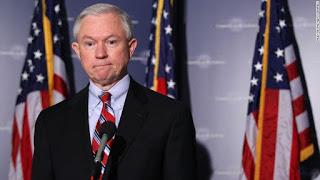
Jeff Sessions
Reports yesterday that Trump Attorney General Jeff Sessions failed to disclose meetings with Russian officials on security-clearance forms brought to mind four little words -- "We told you so."Many voices, including ours, tried to tell the American public, before Sessions was confirmed, that he has a history of being fundamentally dishonest and corrupt -- not to mention racist. Our take on Sessions came largely from living in Alabama for 36 years, where Sessions served as state attorney general or U.S. senator for most of that time. We reported months ago on multiple examples of Sessions' dishonesty -- one involving him directly and another involving his best-known protege.
Now, we learn that Sessions has not changed, with Trump (and a Republican Congress) giving us a chief law-enforcement officer who has not lawfully received security clearance. Worst of all, the justice department that Sessions "leads," was put in the position of making excuses for an AG whose history of failure to disclose and cover up are well known. From CNN, which broke yesterday's security-clearance story:
Attorney General Jeff Sessions did not disclose meetings he had last year with Russian officials when he applied for his security clearance, the Justice Department told CNN Wednesday.
Sessions, who met with Russian Ambassador Sergey Kislyak at least two times last year, didn't note those interactions on the form, which requires him to list "any contact" he or his family had with a "foreign government" or its "representatives" over the past seven years, officials said.
The new information from the Justice Department is the latest example of Sessions failing to disclose contacts he had with Russian officials. He has come under withering criticism from Democrats following revelations that he did not disclose the same contacts with Kislyak during his Senate confirmation hearings earlier this year.
To no one's surprise, the DOJ promptly went into excuse mode. From CNN:
Sessions initially listed a year's worth of meetings with foreign officials on the security clearance form, according to Justice Department spokeswoman Sarah Isgur Flores. But she says he and his staff were then told by an FBI employee who assisted in filling out the form, known as the SF-86, that he didn't need to list dozens of meetings with foreign ambassadors that happened in his capacity as a senator.
Is that, to put it bluntly, bullshit? Should the public believe anything that comes from Sessions' propaganda apparatus? The answers are a resounding "yes" and "no."
Let's consider just two of many dubious incidents from Sessions' time in Alabama:
(1) An Alabama judge accuses Sessions' office of the worst prosecutorial misconduct he'd ever seen
While serving as Alabama's AG in the 1990s, Sessions became entangled in a case styled USX v. Tieco, which dragged on for roughly 10 years and involved both criminal and civil proceedings. Here is the gist of the matter: Officials and lawyers for United States Steel (USX) prompted the AG's office to bring criminal charges against Tieco officials over alleged fraudulent billing. USX also brought civil claims, and Tieco responded with counterclaims.
As the cases moved forward, it became clear that Sessions and the AG's office were acting with blatant favoritism toward USX and its lawyers from the long-established Birmingham firm of Burr Forman, which had represented the steel company for roughly 100 years.
James S. Garrett, then a Jefferson County circuit judge, dismissed the criminal case against Tieco and blasted Sessions' office in an order and opinion. From our December 2016 post on the matter:
As Sen. Jeff Sessions awaits a confirmation hearing in hopes of becoming the next US attorney general, a blistering legal opinion on a case he oversaw as Alabama's top prosecutor two decades ago could emerge as an issue for the nominee. . . .
"The court finds that even having been given every benefit of the doubt, the misconduct of the Attorney General in this case far surpasses in both extensiveness and measure the totality of any prosecutorial misconduct ever previously presented to or witnessed by this court," wrote James S. Garrett, a Jefferson County Circuit Court judge.The misconduct was "so pronounced and persistent," Garrett wrote, that "it permeates the entire atmosphere of this prosecution."
Was Garrett finished showing his disgust for Sessions and his office? Absolutely not. Here's more:
A year after the high-profile indictments, Garrett found that the case was rife with prosecutorial misconduct, including failures to turn over exculpatory evidence, deceptive testimony by assistants or agents of the Attorney General and "flagrant disregard of the constitutional rights of those accused."
"This court can only conclude it is dealing with either intentional and deliberate misconduct or conduct so reckless and improper as to constitute conscious disregard for the lawful duties of the Attorney General and the integrity and dignity of this court and this Judge."
Notice key words in the highlighted section above -- "failure to turn over exculpatory evidence," "deceptive testimony," "disregard for constitutional rights." Sounds a lot like Sessions' actions in the Trump-Russia scandal, doesn't it? So does this.
(2) Federal judge Bill Pryor, a devoted Sessions protege, apparently fails to disclose information to Congress
We have reported extensively on Pryor, a fiercely anti-LGBT judge, who has a history of posing nude for gay magazines and Web sites, dating to his college days in Louisiana in the 1980s. Pryor served under Sessions in the Alabama AG's office and has seen his career boosted at every opportunity when Sessions served on the Senate Judiciary Committee. Pryor was a finalist to replace Antonin Scalia on the U.S. Supreme Court but lost out to Neil Gorsuch, of Colorado, when even the Trump administration apparently could not stomach the thought that the Pryor gay-porn brush fire might turn into a conflagration.

Robed and disrobed Bill Pryor
It's possible Team Trump's queasiness went beyond the "G word" (gay) and the "H word" (hypocrisy) to the "C word" (criminal). That's because evidence points to the likelihood that Pryor committed a crime, lying to Congress, during his confirmation hearings for a spot on the U.S. Eleventh Circuit Court of Appeals. And Sessions, who pushed mightily for Pryor's appointment, probably knew about the crime. Here's how we reported it in a March 2015 post:That brings us to Pryor's Senate confirmation hearing. It is standard for a federal nominee to be asked, under oath, if there is anything in his background that might embarrass him or the president who nominated him. Pryor has known the nude photos were public since at least September 1997, and our sources say he likely did not disclose their existence to FBI and Senate investigators.
What are the possible implications of that? Here is how we answered that question in an earlier post:
"Could Pryor face serious consequences if it is shown he made false statements to officials looking into his background? Based on the impeachment and removal of Louisiana federal judge Thomas Porteous in 2010, the answer might be yes."One of the articles of impeachment against Porteous involved his failure to disclose information to investigators--and his false statements during pre-confirmation regarding any background information that might prove embarrassing to him and the president who nominated him, Bill Clinton.
"Did Pryor withhold information that would embarrass him and George W. Bush? We don't have a certain answer at the moment, but it appears likely."
Yesterday's security-clearance report probably will not be the last one to show that Jeff Sessions has engaged in underhanded behavior. He's had that tendency for decades.
A Republican Congress knew all about Sessions' lack of integrity, but they chose to ignore it. Those Americans who have a few functioning brain cells -- and who lack a tendency to reflexively vote GOP for race-based reasons -- should remember that the next time they go to the polls.
Meanwhile, our best hope is that Jeff Sessions can only do limited damage to our justice system.
